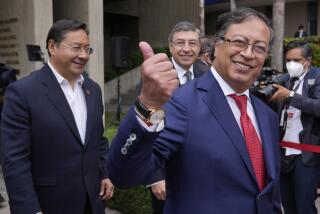Independent Serbian Media Under Siege
- Share via
BELGRADE, Yugoslavia — When all else fails, kill the messenger.
Serbian authorities, who resorted to brute force to put down an armed Albanian rebellion in the southern Kosovo province, have opened a more subtle front in their war on dissent here in the Yugoslav and Serbian capital.
Five Serbian newspaper editors were summoned to police headquarters and threatened with criminal charges following their front-page coverage of police operations that killed scores of villagers suspected of fighting alongside or sympathizing with ethnic Albanian guerrillas.
The editors’ offense, essentially, was to label the dead as “Albanians” instead of the required “terrorists.”
After a stern talking-to, the editors were free to go--mild harassment, perhaps, by Balkan standards. But the March 11 incident is widely seen as part of a campaign to intimidate independent media at a time of political turmoil.
The editors represented Belgrade’s five principal independent or opposition newspapers. As such, they constitute a rare alternative voice in a largely truth-starved country where opposition politicians are silent, ineffective or the butt of jokes.
“We are used to this [treatment],” said Ivan Mrdjen, editor in chief of the independent daily Nasa Borba and one of the cited journalists.
“It is the risk of working in a newspaper like this,” Mrdjen said. “Having an independent editorial policy means permanent conflict with the official interpretation of events--the interpretation by nationalists and warmongering officials.”
He said authorities admonished him that Serbia was “on the brink of war” and that the press “should discipline itself accordingly.” The government says it expects a “patriotic” attitude from the media during national crises.
Nasa Borba’s offending headline announced “20 people killed” in Kosovo clashes. A smaller-type deck listing the victims as “four police, 16 terrorists” apparently was insufficient elucidation.
Pressure on independent media comes amid a steady nationalistic drumbeat in the state-controlled press and on all television and most radio. Nearly all electronic media are controlled by Yugoslav President Slobodan Milosevic or his allies.
*
In daily diatribes, the official media use a derogatory term to refer to ethnic Albanians. They also recount tales of Albanian violence against Serbs through the ages.
Official Radio Belgrade, in an editorial this week, lashed out at the “so-called independent press” for “supporting separatist bandits and terrorists” and justifying armed rebellion.
“Now, with Serbia being attacked like never before in history, there is no hope for [independent journalists],” Radio Belgrade concluded. “There is no court that can help them. . . . Those who today cannot determine whose side they are on have lived in vain. These are times that cannot tolerate any excuse.”
In an unusually poetic flourish for a Communist apparatchik, public prosecutor Miodrag Tmusic explained why he is considering charging the editors with the crime of publishing false information.
“Haven’t we had enough of faceless humanism, distorted altruism and masochistic attitudes toward facts?” he said through the official news agency Tanjug. “I want to believe my suspicions are not correct [regarding] the supreme madness of the free media toward their own state--wounded, imprisoned, stripped of its rights, yet still the origin of our being.”
During the former Yugoslav federation’s Communist era, Tmusic prosecuted a poet who had made fun of Marshal Josip Broz Tito, as well as six dissidents linked to one of Yugoslavia’s greatest writers, the late Milovan Djilas.
The blind patriotic fervor filling the state media these days--and the branding of any opposition as part of a treacherous foreign conspiracy--is reminiscent of the tone used in Serbia in the early part of this decade, as Milosevic drove the crumbling Yugoslav federation toward all-out war.
Milosevic also used subtle harassment of the media during the winter of 1996-97, when months-long street demonstrations posed one of the most serious challenges to his regime. During those protests, authorities deprived newspapers of newsprint, threatened owners and jammed opposition radio broadcasts.
Mrdjen and the other editors charge that Milosevic is clamping down on them to distract the public from his failed policies, his bungling of Kosovo and the economic disaster engulfing the country.
“They have learned nothing from the lunacy of censorship and propaganda during the Bosnia war,” said Aidan White, secretary-general of the Brussels-based International Federation of Journalists, one of several organizations to protest.
More to Read
Sign up for Essential California
The most important California stories and recommendations in your inbox every morning.
You may occasionally receive promotional content from the Los Angeles Times.














